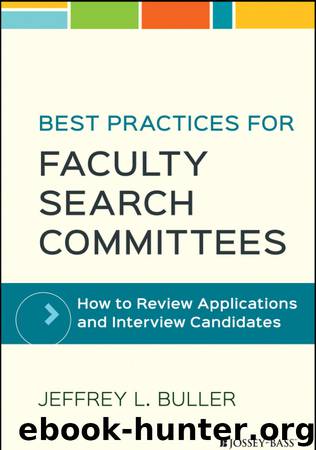Best Practices for Faculty Search Committees by Buller Jeffrey L.;

Author:Buller, Jeffrey L.; [Buller, Jeffrey L.]
Language: eng
Format: epub
Publisher: John Wiley & Sons, Incorporated
Published: 2017-01-09T00:00:00+00:00
best practices for making reference calls
Calls to a candidate's references can be particularly effective at two points in the search process: when narrowing the short list to finalists and when on-campus interviews are over and one applicant must be selected and hired. These two types of reference calls serve different purposes. Those conducted before the on-campus interviews help the search committee learn more about the applicant as a real person and see beyond what can be learned from the paperwork he or she has submitted. Those conducted after interviews are over can help clarify any impressions of the candidate about which the search committee is in doubt, validate statements he or she made in the interview, and send an indirect message to the candidate that he or she is being considered very seriously for the position. That last point falls more into the category of recruitment strategy and may require some clarification. When references are contacted, they almost always notify the applicant that they received a call. Even if you ask references not to do so, they probably will. It's human nature. References tend to be the candidate's mentors or otherwise very close to the candidate; they want to pass on the good news that an institution is giving them serious consideration for the job. Frequently when we interview candidates, particularly for senior positions or those that are difficult to fill, we become concerned that another school will hire our best applicant before we can get an offer ready. By spacing out reference calls to fill the gap between the interview and the offer, we can send a subtle message to the candidate that his or her application is still viable and that we're still very much interested in the possibility of hiring him or her.
Regardless of whether reference calls are made before or after the interview, there are several best practices to keep in mind:
Be respectful of the person's time. References are frequently senior professors or administrators. Your reference call about this candidate is unlikely to be the only one the person receives. Asking the person to take a half-hour or more out of a busy day to speak to the search committee simply wastes the person's time and makes your search effort look unprofessional. Ten minutes should be the maximum amount of time you ask a reference to devote to a call; 5 minutes is even better.
Be well prepared for the call. Have your questions prepared in advance and know exactly what you want to ask. You're likely to be prepared in this way when you initially make the call. But, because references are usually very busy people, you may well have to leave a message to have the person call you back. (In light of the previous point, you may want to stress in your message how brief the return call needs to be. If you say something such as “I just need 45 minutes or an hour of your time,” you drastically decrease the likelihood that you'll receive a return call.
Download
This site does not store any files on its server. We only index and link to content provided by other sites. Please contact the content providers to delete copyright contents if any and email us, we'll remove relevant links or contents immediately.
| Administration | Adult & Continuing Education |
| Business School Guides | College Guides |
| Financial Aid | Graduate School Guides |
| Law School Guides | Medical School Guides |
| Test Preparation | Vocational |
Navigation and Map Reading by K Andrew(4554)
Spare by Prince Harry The Duke of Sussex(4199)
Tuesdays with Morrie by Mitch Albom(3833)
Cracking the GRE Premium Edition with 6 Practice Tests, 2015 (Graduate School Test Preparation) by Princeton Review(3597)
What It Really Takes to Get Into Ivy League and Other Highly Selective Colleges by Hughes Chuck(3221)
Goodbye Paradise(2964)
Never by Ken Follett(2884)
Pledged by Alexandra Robbins(2792)
Kick Ass in College: Highest Rated "How to Study in College" Book | 77 Ninja Study Skills Tips and Career Strategies | Motivational for College Students: A Guerrilla Guide to College Success by Fox Gunnar(2720)
A Dictionary of Sociology by Unknown(2518)
Graduate Admissions Essays, Fourth Edition: Write Your Way into the Graduate School of Your Choice (Graduate Admissions Essays: Write Your Way Into the) by Asher Donald(2476)
Sapiens and Homo Deus by Yuval Noah Harari(2416)
Get into Any College by Tanabe Gen Tanabe Kelly(2384)
Zero to Make by David Lang(2348)
The Social Psychology of Inequality by Unknown(2311)
Machine Learning at Scale with H2O by Gregory Keys | David Whiting(2293)
500 Must-Know AP Microeconomics/Macroeconomics Questions(2242)
Fairy Tale by Stephen King(2072)
Will by Will Smith(2043)
